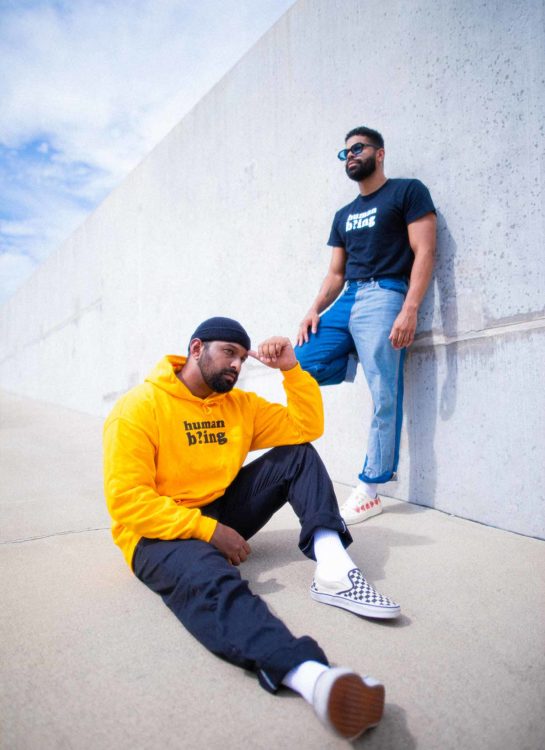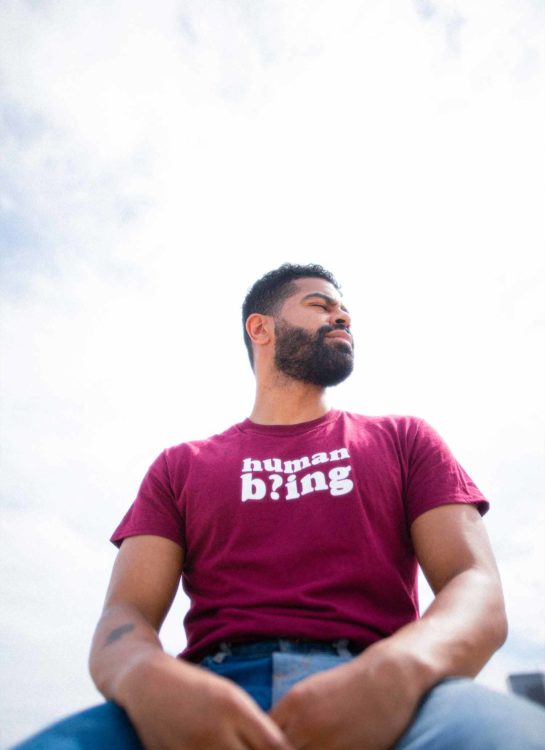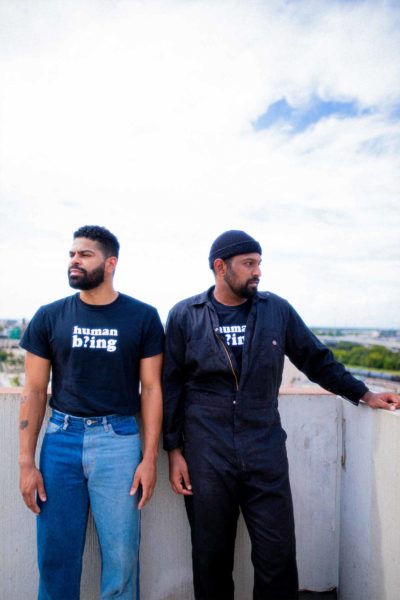- Words Miriam Balanescu
Self-described “empathy pop” artists, the band HOAX, chat to Notion about musical philosophy, globe-trotting, and much more.
Consisting of Mike Raj and Frantz Cesar, HOAX is the inventor of “empathy pop” – a new brand of music hoping to help humans understand their own emotions.
The Queens-based band members behind HOAX met on campus back in 2015 at Hofstra University. Ever since they’ve been inseparable. They also find it tricky to tear themselves away from the studio, working away at their long-awaited concept album ‘b?’. After trekking together to India, the group was transformed by the philosophy they encountered. HOAX has been aiming to translate these transformative ideas into music ever since.
They’ve started to do just that in their latest electro-pop track “goldeneyes”, a castaway single with sunny synths and breezy vocals.
Notion sat down with HOAX to talk about scouting out the Himalayas, how empathy is the essence of humanity and how they’ve changed since their student days.


How long has your ‘b?’ concept album been in the making?
The concept started back in 2017, but we’ve been working on it seriously for the last three years since the end of 2018.
Could you tell us a bit more about the idea behind it and where the idea came from?
The idea of “being” versus “doing” is not something that is unique to us. I think part of the joy of travelling was discovering how different cultures build their lifestyles around what they find urgent and important.
Growing up in the USA, and New York specifically, it seems like the “doing” mentality was kind of how we were all raised. When I say “doing” mentality, I just mean the idea that we get our value and self-worth from the things we are able to accomplish. “You get good grades; therefore, you are smart. You perform well in sports; therefore, you are athletic and talented. You make a lot of money; therefore, you are successful.” Even in fields where I did not expect it, you would find it in music and arts.
The first instrument I learned was the violin starting at the age of 8, and I remember even then there was a program called NYSSMA where they would rate and grade you on your playing ability. I remember being so nervous to get high marks because, in my mind, I wouldn’t be validated unless I did well. And I think the idea of a “doing”-based society is obviously exemplified in global cities like New York because there are just so many people, so everyone needs to stand out.
To contrast that —in 2017, Frantz and I went to Leh, which is in the Himalayan region of Ladakh, India. Up there, it was a completely different culture. I’m not an expert in the region and I don’t know if the people themselves would claim it, but it felt very much like a “being” first culture. The lifestyles were very different than what we were used to in New York, I remember we asked if there was Wi-Fi in our hostel, and they said that Leh hadn’t had wifi for the last 3-4 months because of a winter storm, and there didn’t seem like there was any urgency to resolve that.
People listened more and had airs of peace around them. And time almost seemed to disappear into a vacuum because there wasn’t this sense of hustle and bustle (or “the grind”) that plagued everyone’s psyche. I met people who had been traveling through India for 8-9 months at a time and was astounded by how they were able to survive with little money because of the hospitality and communal mindsets. It was just different. Fast forward to working on these songs and music – I just wanted to create a story that basically looked at how people who are so entrenched in their “doing” lifestyles react if they were now forced into the opposite “being” lifestyle. It’s really just exploring human emotions and the human condition through times of paradigm shifts.
How do you go about exploring philosophy through music?
I think all of my favorite artists across multiple different mediums are exploring big philosophical questions but in simple ways. This creates many layers for the person on the other end of the artform to choose what they want to take away. I try to create the same way, oftentimes involuntarily. I think one of the many beauties of philosophy is that it is an open and constant conversation that is continually built on as time goes on. People will create new ideas, and then a totally different person will build off of that and create something entirely new out of it. It is very much like making music. I like to selfishly hide a lot of ideas that have inspired me in the lyrics, but again my favorite aspect of music and art and philosophy is that it is an open dialogue. I would talk to people about the music we’ve written, and they’ll give me their feelings and interpretations of it. More often than now, I’d think, “Wow, that’s so crazy. I never thought of it like that. I saw it from this point of view” — and neither of us would ever be wrong because art is a shared language. I think with this album, specifically, we are trying to explore more complex philosophical concepts (at least they feel complex to me – they might not be at all haha) more so because it is a conceptual album and we are trying to do it in a non-esoteric way, where you can still enjoy the music if you don’t care for the concepts.


You’ve described your music as “empathy pop”. What do you mean by this?
I think I read on either a Reddit thread or Quora post that empathy is the highest form of intelligence, and that’s more so because empathy can’t really be learned in a classical sense from studying formulas. Feelings are the most real human experience, and so to label the music we create as empathy pop was not to be head-assy but instead, to just aspire to make music that hopefully helps someone understand their own feelings, or help someone understand the feelings of others, including myself. I’m a bit dense. And honestly, writing and reading have opened me up to be a bit less dense and understanding. If I could leave this place accomplishing one thing, it would be to help others open up the same way.
What was the creative process behind “goldeneyes”?
The musical creative process was purely to create a song that existed with both a 4/4 time signature and a 6/8 time signature. We just wanted to challenge ourselves to make a song that used both all the while not sounding forced. If I remember correctly, we made this skeleton for the whole song together, but it was in two different projects and we were constantly trying to figure out how to get them to work together. I think that, like all of our songs, it all made sense once I had the lyrics written — it just tied it all together. Lyrically, the song is about knowing yourself despite having all these things in life that you are putting off, even if they are really important, and not becoming caught up with what you are doing. It’s more so a reminder to take a step back and evaluate what really matters to you in life and make sure you aren’t losing that because you are busy chasing down something that might be temporary.
You’ve been together as a band since meeting at university. Do you feel you and your music has changed since you met in 2015?
I think our style has become more defined (even though we do a lot of experimenting and don’t like to box ourselves into one particular genre). When we started in 2015, we had the typical “new band feeling” where everyone in the band wants to create some crazy memorable part that just shines above the rest, whereas now, I think Frantz and I have gotten into the groove of being servants to the music. Whatever we feel like the song needs, we’ll just try to figure that out and not go overboard with overproducing as well as not underdeveloping the song. Frantz and my musical taste is very much so a center-inflated Venn diagram. There is a lot of shared music that we love together, and then we each have other styles and artists of music that we really love ourselves. All of those influences bleed into our music-making, which is really cool. Musically, it is very easy for us to stay inspired together, and now that we have a couple of songs and projects under our belt, we have a good idea of what makes HOAX sound like HOAX, so making music right now is very satisfying.

What artists are you currently listening to?
Father John Misty, Doja Cat, Frank Ocean, Iris Temple, Free Nationals, Silk Sonic, Daft Punk, Don Mclean, Glass Animals — the list goes on…
What can we expect from the finished album?
Honestly, a giant mess. Haha no — I think when the album comes, I hope everyone can just set aside some time to listen to it in its entirety because we did really try to only curate the songs that we thought would fit together. I think it will be very different from other albums because there are a lot of different styles and ideas being explored, and we might even get criticized for that, but I just really hope people can listen to it at least one time through in one sitting. It’s our debut album, so I think for people who have heard our music before, it’ll be the next evolution of where we are going both musically and creatively.
If you hadn’t become musicians, where do you think you would be now?
We’d probably be working on films together. I feel like we both love films and movies just as much as music. We just don’t have enough time right now to do both. Maybe in the future.
You travelled to India before starting to work on ‘b?’. Where would you most like to travel next?
South America is definitely next on the passport. One of my closest friends is Peruvian, so I definitely want to check out Peru. Not to mention Brazil, Colombia, and Argentina — and then probably Thailand.

